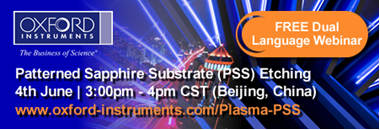The aggressive drive for improved Cost of Ownership within the LED industry has driven innovation within Oxford Instruments Plasma Technology.

Optimised plasma processing offers many ways to improve device output and reduce manufacturing costs, meaning a double windfall for manufacturers. LED manufacture requires critical plasma etch steps (patterned sapphire substrates (PSS), and GaN etch) and deposition steps for passivation, current blocking and mask creation.
These are performed by an increasing variety of techniques for example Plasma Enhanced Chemical Deposition (PECVD). This webinar describes the approaches taken to increase productivity in the PSS etch process.
Dr Mark Dineen, Optoelectronics Product Manager at Oxford Instruments says:
“This webinar presentation describes the approaches taken to increase productivity in these processes, both by increasing the process rates and using technology to improve the yield on each wafer.
!It should be of interest for industry professionals wishing to learn more about the benefits of Patterned Sapphire Substrate (PSS) Etching Using Innovative Plasma Processing Technology. We look forward to answering their questions.”
Presentations will be given in English (Dr Mark Dineen, Optoelectronics Product Manager, Oxford Instruments) and Mandarin Chinese (Dr Young Huang, Field and Lab Applications Manager, Oxford Instruments) and there will be ample opportunity to ask questions in both English and Chinese.
Click here to register for the webinar
About Oxford Instruments Plasma Technology
Oxford Instruments Plasma Technology offers flexible, configurable process tools and leading-edge processes for the precise, controllable and repeatable engineering of micro- and nano-structures. Our systems provide process solutions for the etching of nanometre sized features, nanolayer deposition and the controlled growth of nanostructures.
These solutions are based on core technologies in plasma-enhanced deposition and etch, ion-beam deposition and etch, atomic layer deposition, deep silicon etch and physical vapour deposition. Products range from compact stand-alone systems for R&D, through batch tools and up to clustered cassette-to-cassette platforms for high-throughput production processing.